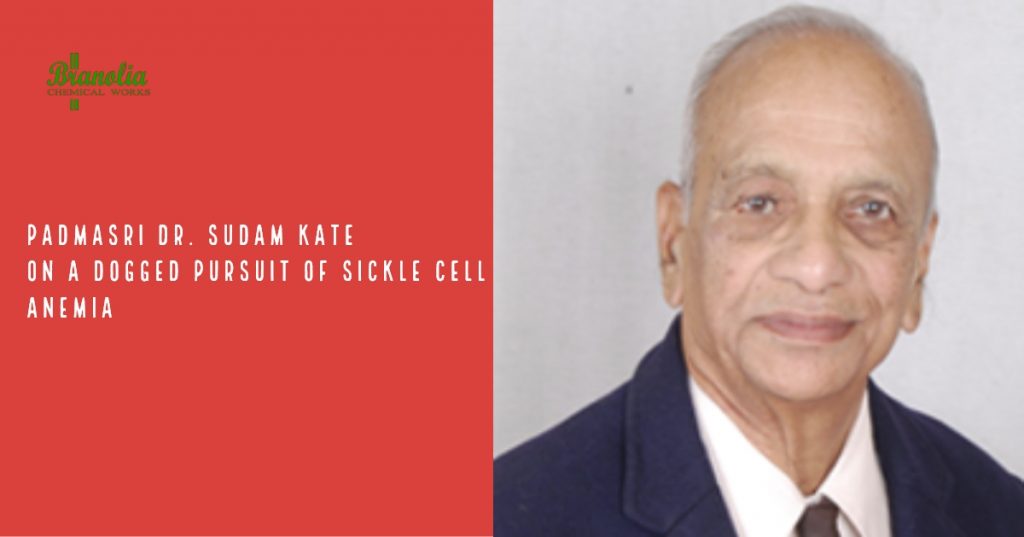Padmasri Dr. Sudam Kate: On A Dogged Pursuit of Sickle Cell Anemia

A young and enthusiastic medical researcher from the BJ Medical College Pune was assigned to assist the Russian anthropologists in the study of the genetic markers among the tribal population group from Maharashtra. This opportunity was to change the life of Dr. Sudama Kate, the young researcher, and for that of thousands of sickle cell patients in the tribal belt of Maharashtra.
During Dr. Kate’s initial work with Pawara tribal groups in the Sahada taluka of Dhule district, he identified a few sickle cell trait carriers and one patient with sickle cell disease. This was the first time such a discovery had been made among the tribal community in the area. Perturbed, Dr. Kate reported the findings to his supervisor at BJMC, Prof GS Mutalik who advised that Dr. Kate continue his study of the incidence of Sickle Cell Anemia amongst the tribal groups. With this started a dogged pursuit of the sickle cell anemia which has spanned 36 years and is still ongoing.
Sickle cell anemia is inherited wherein there are not enough healthy red blood cells to carry required oxygen throughout the body. In a healthy person, the red blood cells are smooth circular structures which move easily through blood vessels and transport an adequate amount of oxygen through the body. The sickle cell anemia patients have a large proportion of red blood cells which are shaped like sickles or crescent moon. Due to its irregular shape, the sickle-shaped cells get stuck in the small blood vessels, thereby blocking the passage and slowing the blood flow and oxygen to parts of the body. Currently, there is no cure for sickle cell anemia, and treatments include relieving of pain and prevent problems associated with the disease.

Heeding his professor’s advice, Dr. Kate immersed himself in research and advocacy pertaining to sickle cell anemia and is considered a pioneer in India in this field of medical research. His work spread across the tribal communities of Maharashtra, Gujarat and Madhya Pradesh. In 1998, Dr. Kate established a Sickle Cell Dawakhana, a sickle cell center, a first of its kind that provides diagnoses, counseling and Ayurvedic treatment mostly to tribal patients at no cost. Till date, more than 2 lakh patients have been screened and more than 3000 patients diagnosed under the center’s medical supervision. The services provided by the center include – (i) Diagnosis (blood testing), (ii) Clinical Examination & Ayurveda. Treatment, (iii) Counselling (patients & parents), (iv) Population genetic survey, (v) Family studies, (vi) Improvement in QOL, (vii)Marriage counseling, ix Genetic counseling, x Training (other NGO), xi Research
Dr. Kamte encourages the use of Ayurveda in combating sickle cell disease. Initially, allopathic drugs like Folic Acid & NSAIDs were used for routine treatment and during crisis period Paracetamol and Soda mint tablets. However, it was thought that sickle cell disease is as old as Ayurveda and there is a possibility that Ayurveda has some treatment for the disease. On the basis of the signs and symptoms of the disease, a search was made in the Ayurveda knowledge base for an answer. The search leads to a few ayurvedic drugs like Bilwa (Aegle marmelos) and others as possible candidates for treatment. Good response has been found from patients after the use of ayurvedic drugs- the general condition of the patient is improved; there is an improvement in the anemic condition and less severity during a crisis. The drug contains about 20% Urea and probably might be acting as an anti-sickling agent.
The grateful nation awarded Dr. Kamte the Padmasri in 2019.
Branolia Chemical Works, one of India’s most reputed ayurvedic therapeutics company, salutes the undaunted effort of Dr. Kate. Such selfless medical researchers and social activists, who are so few in number, make a difference for so many. Branolia Chemical Works has a number of extremely popular ayurvedic formulations like Kulleron, Branolia, Livonia, and Bitocough.
[supsystic-social-sharing id="1"]
